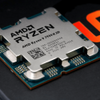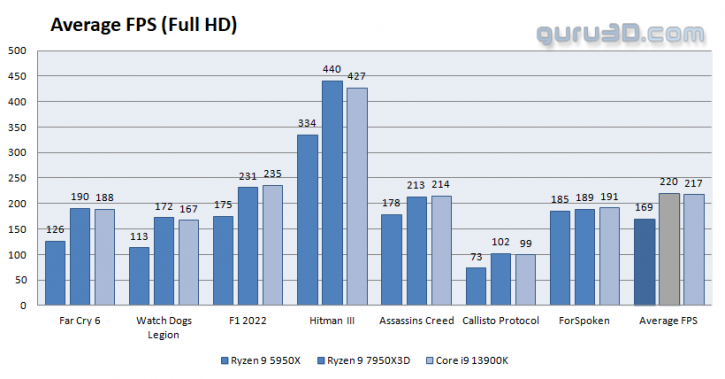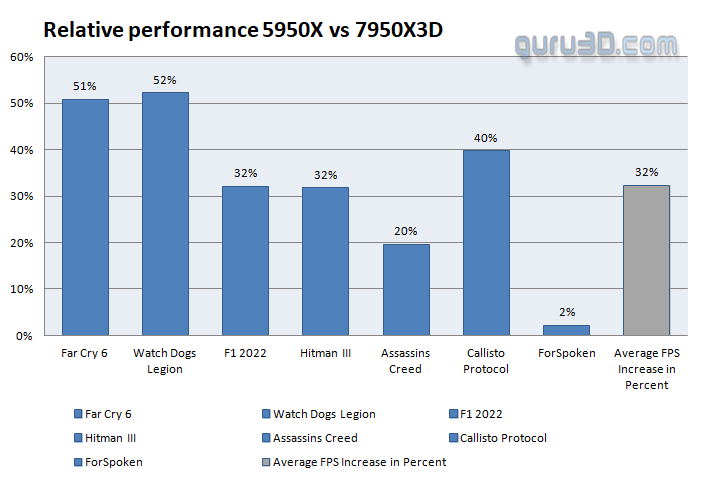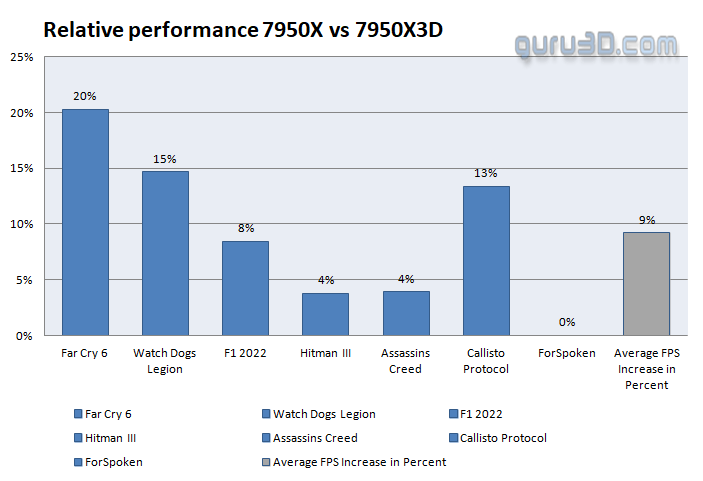Conclusion
Final Words
The X3D series has been long-awaited and is perhaps the best processor (from AMD) for the PC gamers among us (and that's pretty much all of you). AMD did things right; they lowered the TDP to 120W with a PPT of 162W, which is significantly below what Intel is offering. The performance differential compared to the regular 7950X is merely a few per cent, so really, in terms of the overall performance, you are not losing a lot, and yet another benefit is that the processor temperatures are much milder than the 7950X.
Of course, the X3D series is all about that extra chunk of L3 cache, to boost gaming performance. Admittedly it works well; however, what surprised us is that the new 7000X3D is dependent on software. Preferred cores are what that's about. It's not a big thing to install and set up. However, we're not a big fan of that. The 5800X3D, for example, did not have this dependency, as it just worked.
Price and value
The asking price for the Ryzen 90 7950X3D has been kept similar to the 7950X, and if you're a PC gamer then the choice is obvious. So that's a good thing. Overall application performance can be a notch slower, but as the tests have proven, some are now a notch faster.
- Ryzen 9 7950X3D for $699
- Ryzen 9 7900X3D for $599
- Ryzen 7 7800X3D for $449
Gaming performance
Thanks to its improved L3 cache, the 7950X3D can compete even better with Intel's 13900K in terms of gaming performance. Both processors have their advantages and disadvantages, but the difference is so relative that it's unlikely you'll even notice it. It's also worth noting that we tested the processors with a GeForce RTX 4090, so those with slower GPUs will experience a narrower performance gap unless you're gaming at lower resolutions. And yes, there will be some isolated titles with bigger differences, of course.
Above, you can see the previous generation Ryzen 9 5950X versus Ryzen 9 7950X3D. This is measured with a GeForce RTX 4090 at a more CPU-bound Full HD resolution. On average, we measure +32% in performance; that's huge.
Above, you can see the Ryzen 9 7950X versus 7950X3D. Here we can observe a healthy average 9% increase in performance.
And then the 13900K from Intel. Now it has to be stated results will vary wherever you read reviews. The selection of games (the games suite used in benchmarks) will matter heavily per title. Our selection show that the 7950X3D is 1% faster overall than the 13900K. Again that will differ per game title.
Energy efficiency and heat
The Ryzen 9 7950X3D is a processor rated at 120 Watts, a good notch lower than the 170W 7950X. The performance differential isn't that huge. The thermals, however, are much better. So we absolutely agree with AMD on the call they made there. TDP's these days aren't an absolute value anymore; for short bursts of time, the processor is allowed to ramp up power consumption towards 162W. Much like Intel's PL2 states, AMD now applies a higher PPT. So that means your processor can utilize that wattage and in essence, is an 162W processor. TDP/PPT are directly related towards heat output, and our processor hovers in the 80 Degrees C domain with a mainstream LCS cooler under full load on 16 cores; we're even a little impressed with that.
Conclusion
Ultimately, AMD offers a mighty processor with the Ryzen 9 7950X3D. It provides excellent overall performance thanks to 16 performance cores. In single threads, it's pretty fast, in muti-thread very fast. The added L3 cache now brings in an advantage for enthusiast PC gamers as well, allowing ZEN4 to reach Raptor Lake performance numbers in gaming. That said, it's not a clear win, though, but definitely 'enough'. AMD's challenge remains to be pricing. We're not saying the 7950X3D isn't worth $699; we're just saying it's an awful amount of money for a gaming processor. Ergo, we feel that the 7900X3D but, most of all, the 7800X3D at $449 is going to be the most interesting SKU to consider. Of course, you'll need to add the cost of ownership of the AM5 platform. PCIe Gen 5 is now available. However, it serves no function now because no graphics card requires PCIe Gen 5. We also anticipated that AMD would have seeded some Gen5-ready NVMe SSD samples. However, these units seem to run how enough to fry an egg on (when not actively cooled). So now, we'll continue to advise you to purchase a B650 motherboard instead of an X670(E). That choice will save you money. Is the Ryzen 9 7950X the processor to get? We still have a hard time pleading that. Yes, the increased L3 brings excellent performance numbers matching Intel in most cases. However, we frown upon the newly introduced software dependency for core preferences. But as gaming processors go, this probably won't get any better this year, and if I had to choose between the 7950X and 7950X3D, it definitely be the latter one.
- Sign up to receive a notification when we publish a new article
- Or go back to Guru3D's front page.






